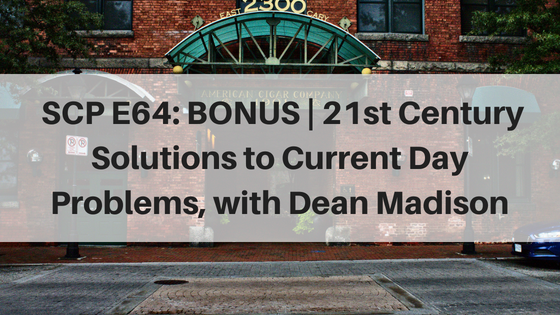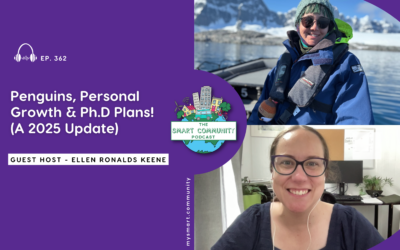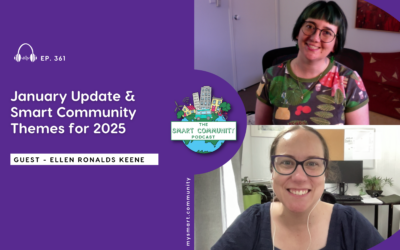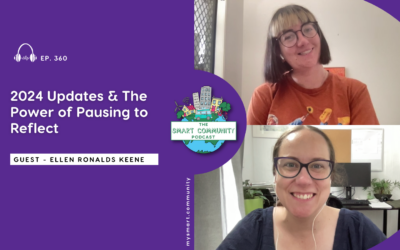In this episode of the Smart City Podcast, I had a really great conversation with Dean Madison, the founder and CEO of T. D. Madison and Associates. Dean has a background in broadband and we first start talking bout IOT and the next generation of services, and how we need to start applying 21st century solutions to our current day problems. Dean is passionate about empowering cities to manage their own complex services and resources, and we also talk about the idea of buying back time and setting up the right foundational infrastructure for a Smart City.
Dean shares some of the things he’s currently working on, which includes setting up this foundational infrastructure and he also talks about setting up a Smart City Ecosystem of open data to allow integration. We talk about some of the emerging trends, particularly the economic and environmental impacts of not implementing Smart city practices and finish talking about using technology instead of trying to build our way out of congestion. As always, I hope you enjoy listening to this episode as much as I enjoyed making it.
Listen Here:
What we cover in this episode:
- Dean’s background in the broadband industry and how that sparked his interest in the Smart City space
- The challenges cities face today and how IOT can be an opportunity to solve these challenges
- What a Smart City is to Dean and why he believes it’s so important
- Some of the The need for the infrastructure tp support the futuristic solutions. The X Future network.
- The two foundations of a Smart city: bandwidth/capacity and the elimination of latency
- How the US is embracing this Smart City concept
- Projects Dean is working on at the moment and looking at where the industry is going to go over the next 3 – 8 years
- Thinking globally and how we can integrate across disciplines using open data, machine learning and AI to use the open data in real time
- Buying back time, space and money for the benefit of our economy and our environment
- Why we need to think differently about using technology so we stop building our way out of problems like congestion
Quotes:
If we stop and think about where we’re going to be over the next 3 – 8 years and we look at the number of IOT devices that are going to be in the marketplace, it’s just astronomical. But the reality is the IOT devices are really dependent on a very strong broadband network.
Most of us think of IOT of more of the residence — Smart lights and doorbells and things of that nature — but there is such a broad concept behind the idea of IOT. As you start to think about Cities and how they can benefit from this next generation of services, to me that is very exciting.
To me, a Smart City goes back to the citizens, and how do we, as local municipalities, provide a better quality of life for the citizens?… Their ability to get around, to have access to information, to provide parking and the most important, to maximise resources.
In the US we’ve had some economic downturns…and it really has stretched the resources for states as well as cities, and I would assume this is the same case all over the world. [A Smart City] is really about managing resources and at the same time really enhancing the quality of life.
To have access to technology that says ‘theres a parking space open 100 feet on the right hand side’ would just be incredible. To me that’s what I think is the real definition as we go forward: creating more time for the citizens and to allow those individual to live a better life.
One of the real challenges is when you’re not dealing in a green field opportunity and you have existing networks in place, whether they’re wireless or wire lined.
A new discussion around whether the internet should be a utility and owned as a non-profit like water or gas or electrical, or should it still be a private endeavour funded by individuals. That’s still a large debate.
Progressive leaders are looking at [the Smart solutions that are available these days] and asking how do we do better?…We can only go back to the citizens so much for additional revenue, taxations etc…cities have to become more efficient.
Technology is just technology, it’s the people who bring it together.
Open data is going to be one of the biggest challenges and maybe one of the largest impediments going forward…there needs to be the capability to access [and analyse] the data, because the data is really where the answers are.
We all get fascinating about the glitzy technology and what it’s capable of…what I don’t think people are talking about is the economic impacts going forward.
Yes, it is about the technology. Yes, we’re very passionate about that, we’re very passionate about the people, but when you really get down to it, it’s about creating a better environment for all of us.
We can’t just keep building from 4 lanes, to 6 lanes to 8 lanes, it doesn’t make any sense. We’ve got to figure out a better way to manage traffic flow.
Connect:
Connect with Dean via his website tdmadison.com
Connect with me via email: hello@mysmart.community
Connect with My Smart Community via LinkedIn or Twitter and watch on YouTube
Podcast Production by Perk Digital






0 Comments
Trackbacks/Pingbacks